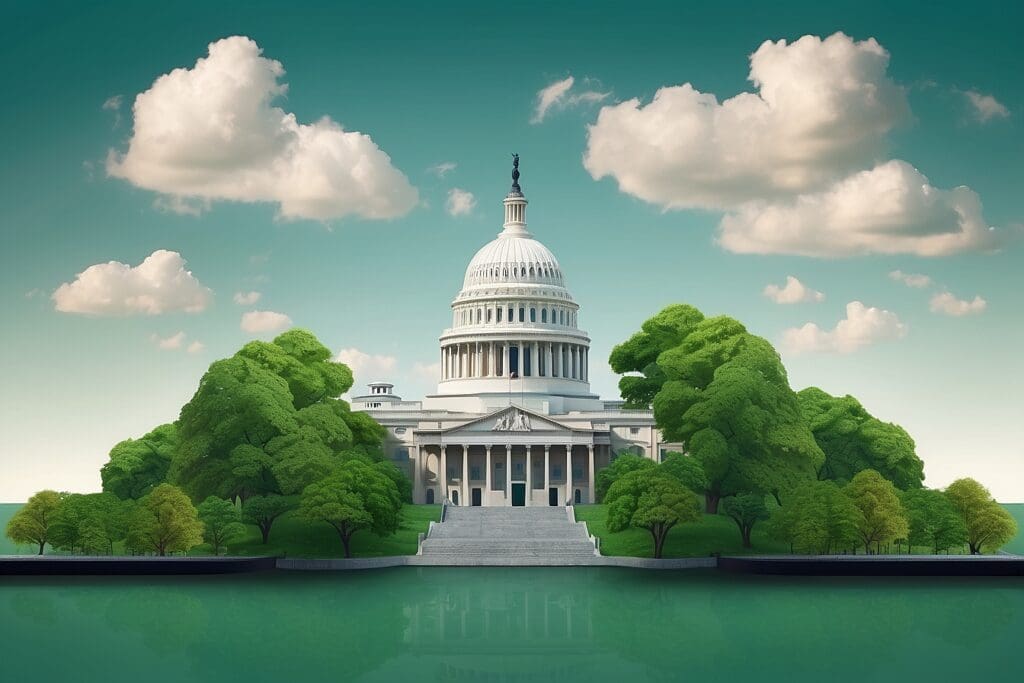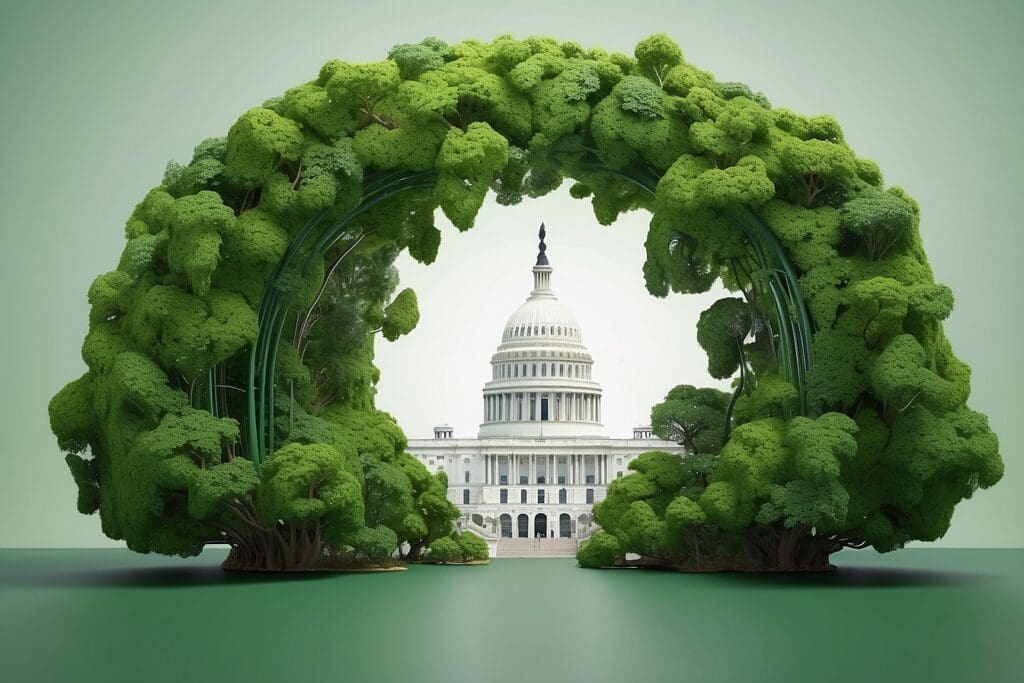As our planet faces environmental challenges, many of us wonder how we can contribute to a greener future. Governments have the unique power to make big changes by supporting businesses that care for our Earth.
This article will explore the important ways in which governments can aid green companies and why this support is vital for sustainable progress. Keep reading to discover how policy shapes our green tomorrow.
Key Takeaways
- Governments enforce policies and regulations that push businesses to reduce their environmental impact, such as requiring the use of renewable energy and enforcing sustainability reporting.
- Financial incentives like tax breaks, grants, and low – interest loans are provided by governments to encourage companies to adopt green practices and innovate within the sector.
- Investment in sustainable infrastructure by governments kickstarts the development of eco-friendly technologies, which helps combat climate change while promoting economic growth.
- Collaborative efforts between government bodies and private organisations drive forward green construction initiatives through shared expertise and resources.
- By supporting research and development with funding, governments enable the discovery of new materials and methods for sustainable building, enhancing industry innovation.
The Government’s Role in Promoting Sustainable Practices
The government plays a crucial role in promoting sustainable practices by creating policies and regulations, investing in sustainable infrastructure, promoting sustainability and climate action, providing funding for green initiatives, and collaborating with the private sector for sustainable partnerships.
Creating policies and regulations
Governments craft policies and impose regulations that require businesses to reduce their carbon footprint, pushing them towards greener operations. Setting strict environmental standards compels industries to rethink how they use resources, ensuring sustainable development remains a priority.
These rules often drive companies to adopt renewable energy solutions faster than market forces alone might dictate.
Mandatory reporting on corporate sustainability also plays a crucial role in making green practices more transparent. By holding firms accountable for their impact on the planet, governments encourage a culture of responsibility and innovation.
Rules around energy efficiency not only help conserve natural resources but also lead to cost savings for businesses in the long run. Implementing these measures signals a commitment to tackling climate change while fostering an ecofriendly economic landscape.
Investing in sustainable infrastructure
Governments play a crucial role in investing in sustainable infrastructure to promote environmental protection and sustainable growth. This involves allocating resources towards developing green technology, renewable energy sources, and eco-friendly practices.
By prioritising clean energy incentives and fostering partnerships with the private sector, governments can accelerate the transition towards sustainable infrastructure and contribute to climate change policies.
Additionally, investing in research and development for green construction can lead to innovative solutions that benefit both the environment and the economy.
Promoting sustainability and climate action
Government policies play a crucial role in promoting sustainability and climate action. By creating and enforcing environmental regulations, governments can incentivise eco-friendly practices and drive the transition to a green economy.
Additionally, public awareness campaigns led by governments contribute to raising consciousness about the importance of sustainable practices, further fostering a positive impact on the environment.
Furthermore, market regulations implemented by governments steer companies towards embracing energy-efficient technologies and sustainable business models. Such initiatives not only benefit the environment but also pave the way for economic growth driven by innovation in green technology and conservation efforts.
Providing funding for green initiatives
To further advance sustainability and climate action, the government plays a key role in providing funding for green initiatives. By allocating financial resources towards eco-friendly projects and businesses, the government actively supports the growth of sustainable practices.
This injection of funds enables green businesses to innovate, develop new technologies, and expand their operations, ultimately contributing to the overall shift towards a more environmentally conscious economy.
In its efforts to support conservation and environmental protection, the government’s allocation of funds for green initiatives acts as a catalyst for progress. This financial backing encourages innovation and investment in eco-friendly solutions, driving positive change across industries while fostering a more sustainable future for all.
Collaborating with private sector for sustainable partnerships
To further support green initiatives, the government collaborates with the private sector to form sustainable partnerships. By working together, both entities can combine resources and expertise to drive eco-friendly practices.
This collaboration fosters innovation and promotes the development of environmentally responsible products and services, contributing to the overall transition towards sustainable business practices.
The Power of Government Policies in Shaping Green Construction

Government policies play a crucial role in incentivising and fostering innovation within the green construction industry. These policies can create a supportive environment for businesses to adopt sustainable practices and drive positive change within the sector.
Incentivising sustainable practices
To encourage environmentally friendly practices, the government provides incentives for businesses to adopt sustainable approaches. These incentives help drive the adoption of eco-friendly measures and technologies, supporting conservation and environmental protection. This support includes:
- Tax incentives for businesses that implement green technologies and adopt sustainable practices, such as solar panels or energy-efficient equipment.
- Grants and subsidies for companies investing in renewable energy sources and sustainable infrastructure, promoting the transition towards eco-friendly operations.
- Rebate programs to encourage the use of environmentally friendly materials and processes in construction and manufacturing.
- Low-interest or interest-free loans for businesses that are committed to reducing their carbon footprint or improving their sustainability efforts.
Fostering innovation in the industry
To drive innovation in the industry, governments can offer grants and incentives to encourage research and development of eco-friendly construction methods. By providing financial support for innovative projects, they can stimulate the creation of new sustainable technologies and materials that benefit both businesses and the environment.
This proactive approach fuels progress towards energy transition and fosters a culture of continuous improvement in green business practices.
Government initiatives play a pivotal role in inspiring forward-thinking solutions to environmental challenges within the construction sector. Encouraging collaborative partnerships between public institutions and private enterprises is another key strategy to drive innovation while creating impactful change.
Advantages and benefits of government policies
Government policies pave the way for a greener future by providing incentives and benefits to businesses that prioritise eco-friendly practices. They offer financial support and tax breaks to companies that adopt sustainable measures, encouraging more businesses to embrace green initiatives. Moreover, these policies create a level playing field for environmentally friendly businesses, ensuring fair competition and market access.
- Enhanced Market Opportunities: Government policies open up new markets for green businesses, creating opportunities for growth and expansion. By incentivising sustainable practices, governments help businesses tap into a consumer base that values eco-conscious products and services.
- Cost Savings: Implementing government policies on sustainable practices can lead to cost savings for businesses in the long run. Through energy-efficient technologies and waste reduction strategies, companies can lower their operational expenses while contributing to environmental conservation.
- Improved Brand Reputation: Embracing green practices as a result of government policies can enhance a company’s brand reputation. Businesses aligning with sustainability initiatives gain credibility among environmentally conscious consumers and increase their appeal in the market.
- Innovation Drive: Government-backed policies stimulate innovation within industries by fostering research and development in sustainable technologies and processes. This leads to the creation of new opportunities for businesses to develop cutting-edge solutions that benefit both the environment and their bottom line.
Government Strategies for Accelerating Green Construction

The government can accelerate green construction through regulatory reforms, promoting partnerships and collaborations, and investing in research and development. These strategies are crucial for driving the adoption of sustainable practices in the construction industry.
Regulatory reforms
Governments implement regulatory reforms to ensure eco-friendly practices are upheld. These reforms play a key role in fostering sustainable business operations. They include:
- Setting strict emission standards for industries to reduce environmental impact.
- Enforcing waste management requirements to minimise pollution and encourage recycling.
- Establishing guidelines for energy – efficient building design and construction.
- Imposing fines and penalties for non-compliance with green business regulations.
- Monitoring and evaluating the effectiveness of environmental policies through regular assessments.
Promoting partnerships and collaborations
Transitioning from regulatory reforms, fostering collaboration and partnerships with private businesses is crucial for driving the green construction agenda forward. By working together, governments and private sector can leverage each other’s strengths to develop innovative solutions that promote sustainability and eco-friendly practices in the construction industry.
These partnerships can lead to shared resources for research and development, as well as the implementation of more effective sustainable initiatives. This collaborative approach fosters an environment where both parties can benefit from shared knowledge and expertise to advance climate change policy and support environmentally friendly projects.
The government’s commitment to promoting partnerships and collaborations demonstrates a unified effort towards achieving common goals in sustainable construction. Through these cooperative efforts, impactful changes can be made by harnessing collective expertise, investments, technologies, and best practices from both public and private sectors.
Investing in research and development

Transitioning from promoting partnerships and collaborations, investing in research and development is crucial for driving innovation in green construction. By allocating resources to R&D, governments can support the advancement of sustainable technologies and practices.
This investment enables the exploration of ecofriendly materials, energy-efficient designs, and cutting-edge construction methods that benefit both the environment and businesses.
Encouraging research and development fosters the growth of green businesses by providing them with access to state-of-the-art solutions, fostering a culture of innovation that further propels sustainable practices forward.
Conclusion
In conclusion, the government plays a crucial role in supporting green businesses. It creates policies and regulations to promote sustainability and climate action. Furthermore, it invests in sustainable infrastructure and provides funding for green initiatives.
By collaborating with the private sector, the government fosters sustainable partnerships that drive eco-friendly practices forward. Overall, the government’s active involvement is vital in advancing environmental conservation and supporting green businesses.
FAQs
1. What does the government do to help green businesses?
Governments provide support and incentives for green businesses which adopt eco-friendly practices to ensure a healthier planet.
2. Can new eco-friendly companies get help from the government?
Yes, emerging eco-friendly companies can often access special programmes and financial aid that encourage sustainable business models.
3. Do governments offer training for green businesses?
Many governments organise workshops and provide resources aimed at educating business owners about implementing and managing eco-friendly practices effectively.
4. Why is it important for governments to support eco-friendly businesses?
It’s crucial because when governments back these businesses, they promote environmental sustainability and foster an economy that values protecting our natural resources.



